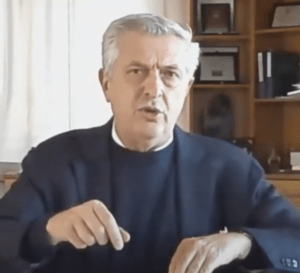The war in Ukraine has driven the number of forcibly displaced persons worldwide to a record-setting 100 million, according to the United Nations.
The 90 million figure reached at the close of 2021 was quickly surpassed after Russia’s Feb. 24 invasion of Ukraine, which forced 3.3 million to seek refuge in other nations and another 6.5 million to become displaced within their home country.

Filippo Grandi
“One hundred million is a stark figure — sobering and alarming in equal measure. It’s a record that should never have been set,” said Filippo Grandi, U.N. high commissioner for refugees. “This must serve as a wake-up call to resolve and prevent destructive conflicts, end persecution and address the underlying causes that force innocent people to flee their homes.”
The current number of forcibly displaced persons represents 1% of the world’s total population and “is equivalent to the 14th most populous country in the world,” UNCHR reported. “The number includes refugees and asylum seekers as well as the 53.2 million people displaced inside their borders by conflict.”
Many countries have welcomed the refugees from Ukraine, especially in those countries bordering Ukraine. “The international response to people fleeing war in Ukraine has been overwhelmingly positive. Compassion is alive, and we need a similar mobilization for all crises around the world,” the UNHCR report said.
While European nations have borne the brunt of the Ukrainian exodus, others, including the United States, have exhibited more tepid responses.

Andy Semotiuk
“All America has done is to offer Ukrainians currently in America Temporary Protective Status for 18 months. That protects some 75,000 Ukrainians in the U.S. from deportation and enables them to apply for work permits. But it does not address the immediate and urgent ballooning Ukrainian problem in Europe. American inaction in the face of this overwhelming burden overseas, if continued, could pose a serious threat to unity in NATO,” immigration expert Andy J. Semotiuk wrote recently for Forbes.
An immediate and partial solution would be to accept immigrants who have family in the U.S. willing to sponsor them, Semotiuk said. “For example, in the case of the USA, the goal of 75,000 Ukrainians would be roughly equal to the number of refugees from Afghanistan that have been targeted recently.”
“As for a long-term solution to the problem of Ukrainian displaced persons in Europe today, and indeed the problem of other displaced persons as well, it is worthwhile to consider what Allied countries did at the end of World War II to deal with the humanitarian crisis then,” he continued. Then, the U.S. accepted 450,000 refugees displaced by war.
“To qualify, they had to have a sponsor and a place to live on their arrival, work in a job that would not displace American workers or have a relative that was an American citizen that would support them,” Semotiuk explained.
Before any of this can happen, the U.S. must first reimagine and reinvent its immigration system, according to leaders with the National Immigration Forum.

Danilo Zak

Dan Kosten
“The United States needs a new refugee admissions methodology that adapts to global resettlement needs, aligns with our capacity to welcome, and faithfully reflects the historical intentions of our refugee laws and the values of charity rooted in the American spirit,” the forum’s Danilo Zak and Dan Kosten wrote in February.
One significant problem with the current U.S. system is that it relies too heavily on the White House for its goals and operation. Over time, they said, “it has become clear that a system that delegates so much authority to the executive cannot live up to the goals enumerated in the first title of the Refugee Act. As the number of refugees in need of resettlement doubled from 2014 to 2021, U.S. refugee admissions cratered to record lows.”
The numbers bottomed out due to the Trump administration’s dismantling of resettlement infrastructure and setting such low admissions levels that they could not respond to the needs of refugees from China, Burma, Sub-Saharan Africa and Southeast Asia, the forum said. “Reports suggested the Trump administration repeatedly considered eliminating the refugee program altogether.”
The forum, and the Alliance for a New Immigration Consensus which it helped launch earlier this year, have advocated for comprehensive immigration reform and for a refugee resettlement system responsive to current global needs.
Faith-based groups like the Baptist World Alliance, meanwhile, also have been pressing governments to embrace more compassionate and flexible immigration practices.
“Feeling the deepest disquiet over the plight of the homeless peoples of the world, we plead with all governments to give care and human rights to the dispossessed peoples within their jurisdiction so they may live with hope and security within their own country,” BWA said. “We urge the governments of all countries to act with humanitarian concern toward persons seeking shelter as a result of personal dispossession or exclusion from their own nations, and we commend those governments which have already done so.”
Related articles:
There’s a path for Ukrainian refugees to the U.S. but the process remains too slow
What’s the fastest route for Ukrainian refugees to enter the U.S.? Cross the Mexico border


